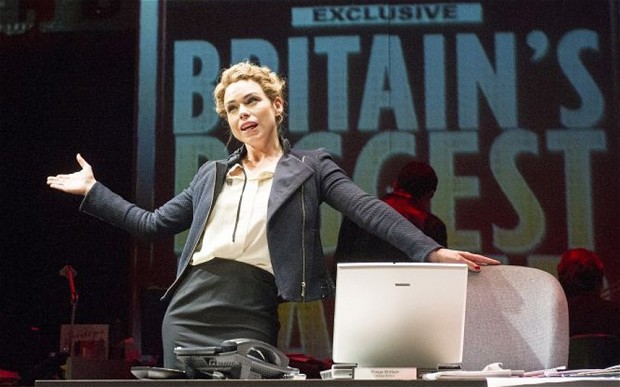You have no items in your cart. Want to get some nice things?
Go shopping
Last week, the National Theatre pulled off a publicity coup when they announced that Richard Bean’s new play, Great Britain, would be opening five days later without previews. The late announcement was supposedly due to legal issues surrounding the play’s subject matter of phone hacking, but there was also something exciting about the way a theatre “dropped” a play like a musician would “drop” an album, and ticket sales were undoubtedly helped by that fact. Watching the play on opening night, however, I couldn’t help shaking the feeling that it felt topical without being overtly contemporary; after all, most of the (fictionalised) events in the play happened years ago. Great Britain thus never really felt like “event theatre” in the way it promised. As such, it throws up interesting questions about the possibility of theatre to be truly contemporary, and demonstrates the difficulty of theatre to achieve a genuine feeling of now-ness.
Looking back through much of the twentieth century, topical theatre has a rich and varied history. During the Bolshevik Revolution in Russia, for example, agit-prop theatre troupes created “Living Newspapers” as a way of discussing events happening throughout the country, whilst Franklin Delano Roosevelt’s New Deal in America gave money to various companies to respond to social and political struggles of the time. But whilst some theatres in the UK have attempted similar programmes – most notably perhaps with Max Stafford-Clark’s desire to create a “Royal Court Instant Response Unit” a couple of decades ago – the idea has never really taken hold.
Why this is has never really been clear; perhaps it is our general aversion to overtly political theatre or our reliance on many months of preparation and dramaturgy. As Mark Lawson has recently pointed out, our theatrical structures mean that crossover with current affairs is either accidental or planned, making it difficult for theatres to create productions which are of immediate concern.
The question, of course, is whether it is theatre’s place to do so? While we have the wishy-washy, semi-propagandistic likes of Have I Got News For You and Mock The Week, theatre will pale in comparison in terms of turnaround and viewership. The best theatre, arguably, doesn’t try to comment on specific events but looks at structures and modes of thought as a way to better understand the world around us.
It is for this reason that, in the past couple of months, the work the Almeida has been producing feels far more current and contemporary than Great Britain by a long shot; both Mike Bartlett’s King Charles III and Anne Washburn’s Mr Burns are plays which look into the future in order to throw up questions about the present. These two productions found an original way of considering how we live and think now, and in doing so offered an option for an alternative which Bean fails to uncover in his Fleet Street farce. So too, did they feel far more dangerous than the National’s production, which even on press night with dozens of our country’s elite in attendance felt a bit like a point-and-laugh. The Almeida season, however, has demonstrated how we are complicit in the actions on stage, and sets up dichotomies which are at the least thrilling, at best revolutionary.

About Dan Hutton
Dan is a freelance critic and theatre-maker. He won the Howard Hobson Award for Theatre Criticism at NSDF in 2010, 2011 and 2013, and in 2013 was the runner-up for the Edinburgh Fringe Allen Wright Award for Arts Journalism. Dan is also a director and co-runs Barrel Organ Theatre.




